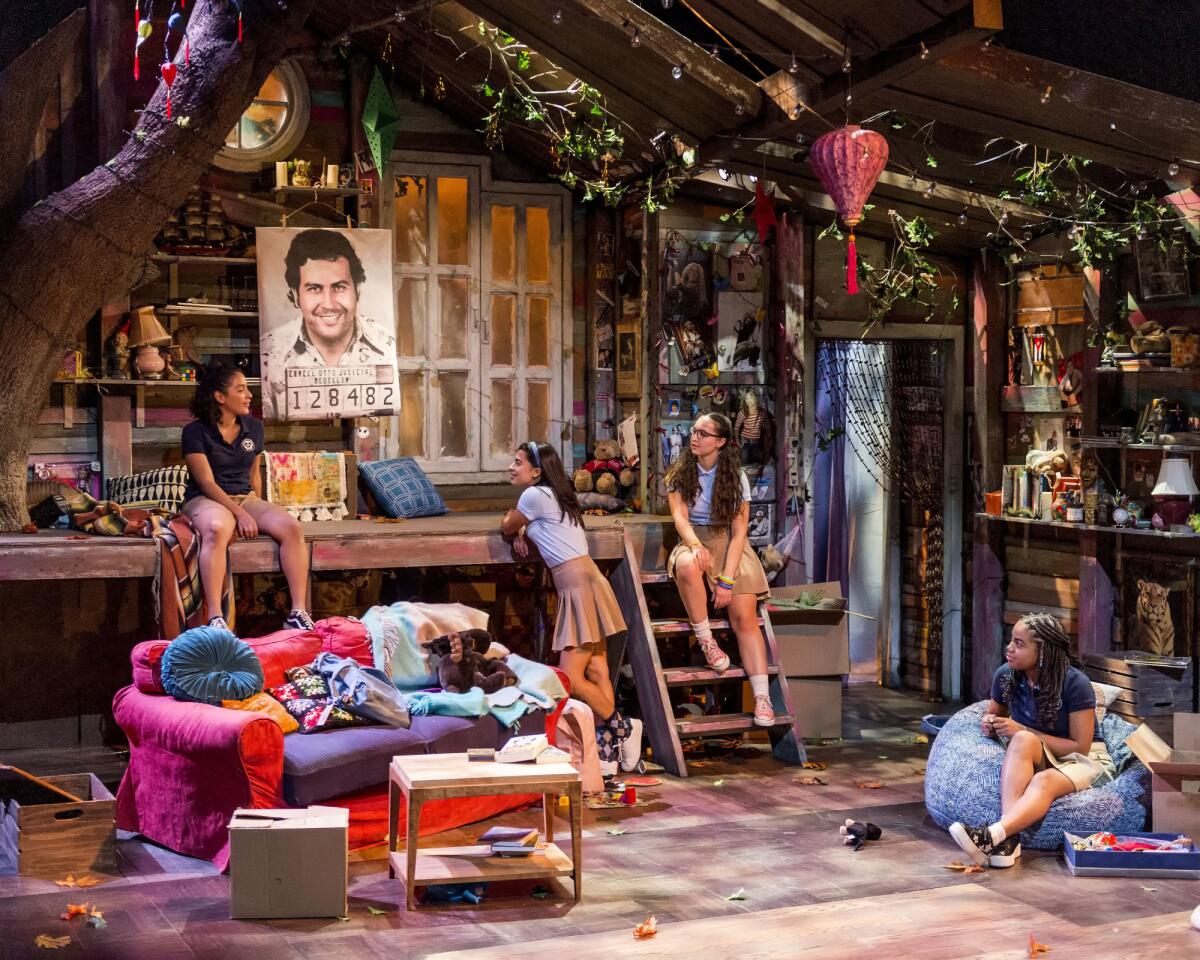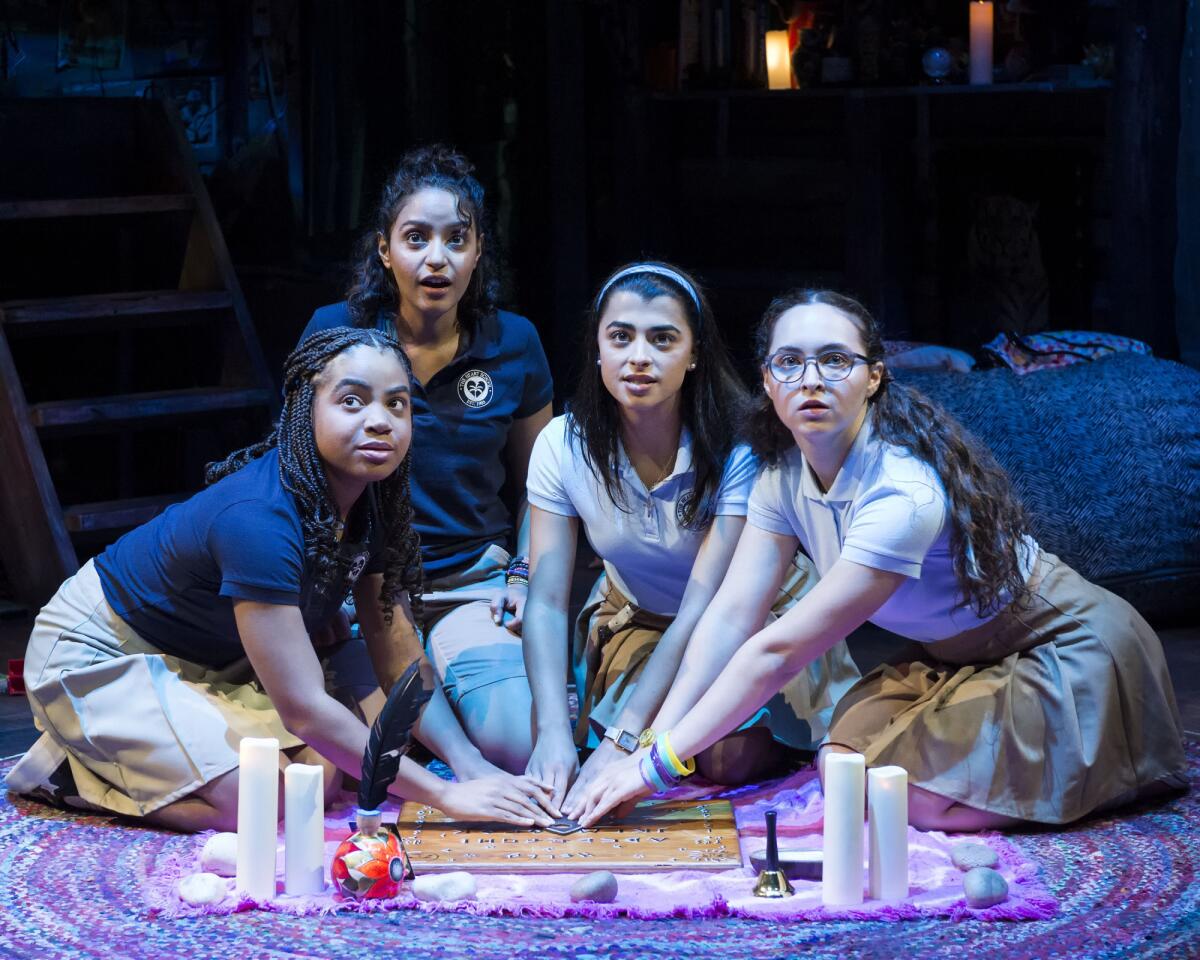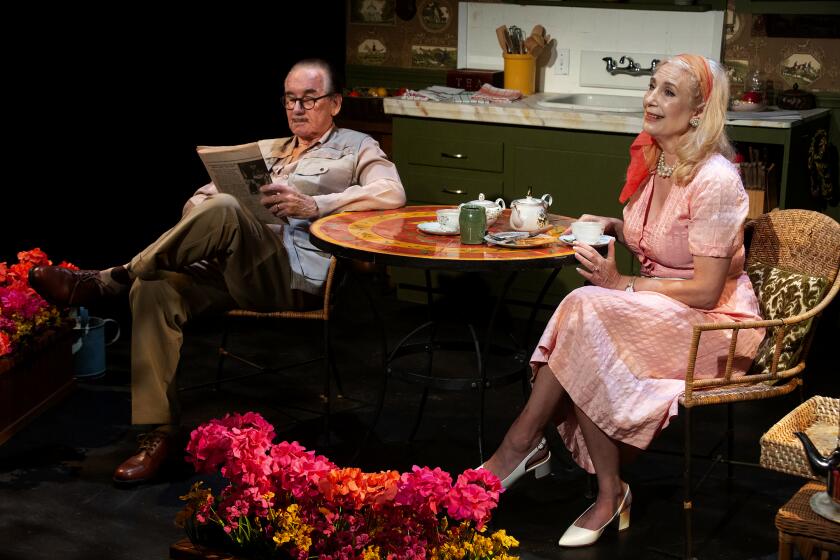Review: Kirk Douglas Theatreâs electrifying âOur Dear Dead Drug Lordâ will test your nerves

Itâs not easy to make a hardened theater critic squirm in his seat, but I wasnât sure I had the toughness to withstand the opening scene of âOur Dear Dead Drug Lord,â Alexis Scheerâs critically touted play about the savage secret lives of teenage girls.
Donât let the jovial tree house setting fool you. The play, which opened on Sunday at the Kirk Douglas Theatre in an electric Center Theatre Group production (a collaboration with IAMA Theatre Company), tested my nerves in a way that few plays have in recent memory.
The four young people who meet regularly in this abandoned aerie are members of a dangerous club. Private school students in Miami, theyâve dedicated the schoolâs dead leaders club to a darker purpose: worshiping the ghost of Colombian narco-terrorist Pablo Escobar. (They originally tried the same premise with Adolf Hitler but didnât like it when they got labeled a hate group for wearing swastikas to school.)
The horror of the opening scene involves a stray cat concealed in a box. The girls are intending to sacrifice the animal as part of a ritual to initiate Kit (Coral PeĂąa), a new club member, who has to prove her murderous mettle.
Squeeze (Samantha Wynette Miller), whoâs highly allergic to cats, wants the offending creature eliminated as quickly as possible. But Pipe (Lilian Rebelo), the clubâs president, demands that the ceremony be scrupulously observed. Zoom (Ashley Brooke), though usually game for anything, canât help worrying that killing the animal will make them seem like âpsychopaths.â
I canât morally justify why this depiction of animal slaughter affected me more than, say, the portrayal of human tragedy onstage. But I found myself in an agonizing place in the early going â which is exactly where Scheer wanted me to be.
âOur Dear Dead Drug Lord,â which premiered in New York in 2019 in a co-production between WP Theater and Second Stage Theater, is part of a wave of provocative dramas about the group dynamics of adolescent girls. Plays such as Clare Barronâs âDance Nationâ and Sarah DeLappeâs âThe Wolvesâ have been opening our understanding of the wild interior landscapes of young women crossing the threshold into sexual maturity under the shadow of punishing societal strictures and the threat of male abuse.
Like Jocelyn Biohâs âSchool Girls; Or, the African Mean Girls Play,â âOur Dear Dead Drug Lordâ is acutely mindful of the hierarchy of its adolescent world. Alliance shifts and mutinies occur, but leadership is hard to fake and Pipe is a born boss.
Ownership comes naturally to her. She rules the tree house (designed by François-Pierre Couture as a not implausible fantasy hideaway) like a McMansion. Her family, affluent and conservative, is of Cuban background. Sheâs entitled, and proud of it.
Kit, raised by her Colombian mother, assumed she was speaking to Pipeâs mother when she called at her house. But it turns out she was talking with the familyâs cleaning lady â one example of Pipeâs luxurious lifestyle that Kit is unaccustomed to. Pipe and Kitâs differences draw them together. They have more in common than meets the eye.
The year is 2008, Barack Obama is running for president, and Pipeâs family has a John McCain sign on the lawn. Pipe claims to be an independent, like her parents, but sheâs unable to censor her Republican views.
âSo what, Iâm supposed to vote for the Black guy just because heâs Black and trendy, and his face is on all the shirts at Urban Outfitters, and just put aside the fact that heâs basically a socialist?â she asks, to the dismay of her friends.

Scheer incorporates Miamiâs distinctive multiculturalism into the drama. The girls suspect that Kitâs father might be Escobar because of her Colombian background. Kit doesnât know much about her father, who died just after she was born, and the mythologizing of her birth amuses her.
At 15, Zoom, whose family is Jewish and lives next door to Pipeâs, is the youngest of the group. Excitable and eager to please, she has a chameleon-like ability to blend in with the cultural influences around her.
Perhaps the brightest of the girls, Squeeze, of Puerto Rican and Haitian background, discusses the fine points of SanterĂa practice with Pipe, who wants the club rituals to open a portal to the supernatural. A Ouija board is part of the magic they use to make contact with the spirit of Escobar.
Harold Pinterâs 1959 play âA Slight Acheâ is presented at the Odyssey Theatre in a production featuring Susan Priver, Henry Olek and Shelly Kurtz.
What are these young women after? The illicit appeal of a drug lordâs lawlessness resonates strongly with their desire to break out of systems that treat them like subjects instead of queens. But rescue from disempowerment is only one motivation.
Haunting the girls are losses too painful to process. Death has been no stranger to them. There are missing pieces in their families. Friends have vanished. Traumatic events have left them in a state of unfinished grieving.
Vibrantly directed by Lindsay Allbaugh, âOur Dear Dead Drug Lordâ is a true ensemble piece. The playâs overlapping conversation is a symphony of interruptions and resonant non sequiturs, adroitly conducted.
The company of actors at the Douglas doesnât disappoint in creating portraits that resist generalizations. These characters are individuals first and foremost. As soon as you think theyâre falling into types, they surprise you with their unpredictability.
Rebeloâs Pipe is aggressively privileged, but her social brutality has cracks of empathy. And she has a soft spot for outsiders with gumption, because down deep she recognizes that this is what itâs going to take for her to lead an authentic life.
PeĂąaâs Kit exerts an uncanny hold on Pipe. Her strength, born out of circumstances Pipe has never had to face, leaves the others in awe. Sheâs the only one who has to take an after-school job, but she never lets any of the clueless comments of her new friends crimp her dignity.
Millerâs Squeeze is in some ways the most surprising of the girls. Sharp as a tack, and with a social conscience beyond her years, she seems destined to be head of state one day. Yet spend enough time in her dazzling presence and youâll note the heartbroken child inside of her. Millerâs performance, which includes a cathartic dance sequence she choreographed to give expression to the tragedy that befell her family, contains multitudes.
Brookeâs Zoom is the wild card. She may seem the most innocent and impressionable of the group, but she has a spine. And to everyoneâs shock, she reveals a hard-to-believe secret. (Sex is at the root of most of the playâs mysteries.)
The violence that begins âOur Dear Dead Drug Lordâ that almost sent me running out of the theater reaches a level of horror that had me clutching my head in shock at one point. Scheer isnât messing around. The play does something even more unexpected than introduce two new characters and switch into Spanish at the end. It approaches Antonin Artaudâs theater of cruelty.
Like Artaud, Scheer doesnât believe that the theater can touch us if it stays within polite, respectable limits. The leap into blood and madness is an attempt to break out of the straitjacket of realism into something less controllable and familiar. To this end, the crack design team activates Coutureâs tree house with otherworldly lighting (Azra King-Abadi) and propulsive sound (Veronika Vorel) that transform the stage action into a surreal hallucination.
Iâm still working out the ending, which mixes empowerment with violent transgression. The opening-night audience might have been cheering as though defiant liberation was the main message, but the playâs politics should be unsettling. Thereâs no sugarcoating the deranged deeds that unfold.
Good drama doesnât shy away from ambiguity, even as it draws us emotionally closer to characters who disrupt our sense of right and wrong. âOur Dear Dead Drug Lordâ is open to contradictory interpretations. One interpretation might even illuminate how a sizable portion of the nation is beholden to a rule-flouting politician who is now marketing his mugshot to pay his mounting legal bills while he runs for president.
âOur Dear Dead Drug Lordâ
Where: Kirk Douglas Theatre, 9820 Washington Blvd., Culver City.
When: 8 p.m. Tuesdays-Fridays, 2 and 8 p.m. Saturdays, 1 and 6:30 p.m. Sundays. Ends Sept. 17.
Tickets: Start at $30
Contact: (213) 628-2772 or centertheatregroup.org
Running time: 1 hour, 30 minutes
More to Read
The biggest entertainment stories
Get our big stories about Hollywood, film, television, music, arts, culture and more right in your inbox as soon as they publish.
You may occasionally receive promotional content from the Los Angeles Times.












